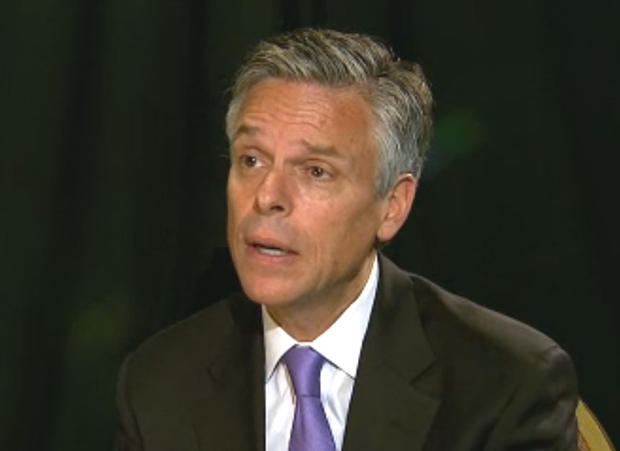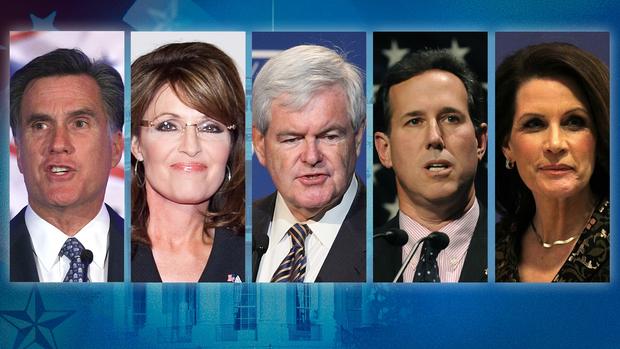Jon Huntsman seeks to be "Romney alternative" in 2012 GOP race
With his official entry into the presidential race Tuesday, Jon Huntsman is gaming for the top "Romney alternative" slot within the Republican field.
As Mitt Romney understands better than anyone, running for president as a high-profile, relatively moderate Republican can attract campaign dollars and support -- but it also engenders the wrath of the Tea Party and other stalwart conservatives. How Huntsman will fare against Romney -- and a Republican field largely peopled with more conservative candidates -- depends on how he handles certain key issues.
Can Huntsman quickly establish himself as a conservative, in spite of his affiliation with the Obama administration? Can he escape the scrutiny on issues like health care reform that Mitt Romney has received? Can he hold his own against hawkish party leaders on issues like foreign policy?
Huntsman, the former Utah governor and until recently President Obama's ambassador to China, will announce his campaign for president Tuesday morning at Liberty State Park in Jersey City, N.J., with the Statue of Liberty in the background. The setting channels Ronald Reagan, who opened his 1980 campaign there. While Huntsman served as a staff assistant in the Reagan White House, Republican primary voters will probably more keenly note Huntsman's more recent public service under Mr. Obama.
When Huntsman resigned from his post as ambassador in April, a network of GOP operatives had already set up his campaign apparatus, the New York Times reported in a profile of the candidate. But even though establishment support exists for his candidacy, Huntsman has to prove to voters his campaign is more than just a political power grab.
"If he can square the peg on why he left the Obama administration over principle as opposed to politics, he's going to be well on his way," said Scott Reed, a Republican operative who managed Republican Bob Dole's 1996 presidential campaign.
Huntsman needs to deliver a message strong enough, Reed said, to counter the fodder out there his opponents could use to cast him as an Obama ally. He won't be helped, for instance, by what the Daily Caller dubbed "Huntsman's love letters" to Mr. Obama.
"You are a remarkable leader," Huntsman wrote to Mr. Obama in Aug. 2009, underlining the word "remarkable."
And as Huntsman's candidacy gains more attention, his past positions on health care reform are also likely to haunt him. Like Romney -- and many other Republicans -- Huntsman has at some point supported a version of a health care mandate. "I'm comfortable with a [state health insurance] requirement," Huntsman said in a 2007 interview. "You call it whatever you want but at some point we're going to have to get serious about how we deal with this issue... There is a mandate today, let us not forget, and it's called the emergency room."
While Romney has consistently defended the Massachusetts health care mandate (perhaps trying to escape his "flip-flopper" reputation), Huntsman has said more recently he didn't support a mandate in Utah. "I didn't push mandates with the legislature. You want to get that right," he said in New Hampshire last month.
As Huntsman tries to separate himself from President Obama on health care, he's also taking on the president's foreign policy. He's staked out a skeptical stance on the war on Afghanistan, as well as the U.S. involvement in Libya.
"Should we stay and play traffic cop? I don't think that serves our strategic interests," Huntsman said with respect to Afghanistan in an interview with Esquire magazine. He added that the U.S. "just can't afford" to be involved in Libya.
While this puts Huntsman in a position to challenge the president in the general election, it leaves him open to criticism in the primaries, which are dominated by the party's conservative base. Some of the GOP's leading hawks are taking issue with the anti-interventionist sentiments currently running through the party.
"If you think the pathway to the GOP (Republican) nomination in 2012 is to get to Barack Obama's left on Libya, Afghanistan and Iraq, you are going to meet a lot of headwinds," Sen. Lindsey Graham (R-S.C.) said on NBC's "Meet the Press" Sunday.

